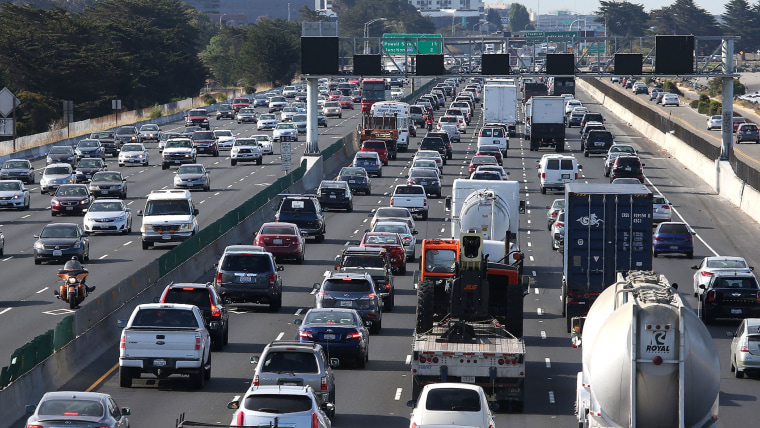For many years, the Republican Party touted federalist principles that stressed the importance of state control. The underlying idea is straightforward: the government that's closer to the people will be more responsive to the public's needs and interests.
There are about 1,000 good examples of GOP officials discarding these principles when it suits the party's purposes. As of this morning, there are about 1,001.
President Donald Trump on Wednesday barred California from setting its own vehicle emissions standards, kicking off a battle that is likely to last well beyond the 2020 presidential election."The Trump Administration is revoking California's Federal Waiver on emissions in order to produce far less expensive cars for the consumer, while at the same time making the cars substantially SAFER," Trump tweeted Wednesday morning, noting that the move will lead to "older, highly polluting cars" being replaced by "new, extremely environmentally friendly cars."
If you're new to this story, let's review how we got here because it's quite a story.
To address the climate crisis, the Obama administration created tough fuel-efficiency standards for the auto industry, to be phased in gradually. Manufacturers, not surprisingly, weren't thrilled, but there was a broad realization that the policy, in conjunction with a series of related efforts, would make a positive difference.
Then Donald Trump got elected. Last summer, the Republican White House announced plans to roll back the tougher standards, making it easier for the automotive industry to sell less efficient vehicles that pollute more.
The president assumed he was helping the industry at the expense of the environment -- a trade-off Trump was happy to make since he rejects climate science anyway. What the White House didn't anticipate was the fact that auto manufacturers concluded that Trump's anti-climate plans went too far. In fact, in early June, most of the industry urged the administration to change course, because its plan would produce "untenable" instability.
Why? Because Trump's plan to gut pollution safeguards was so drastic that many states announced plans to enforce stricter emissions standards on their own. That included California -- home to the nation's largest consumer base.
The result was a mess: car manufacturers, which had already begun taking steps to comply with the Obama-era policy, faced the prospect of having to make different vehicles to sell in different parts of the country. Not surprisingly, no one saw that as a sustainable business model.
The White House briefly tried to work out a deal with California, with the intention of creating national standards that everyone could live with. Those talks failed and the administration broke off negotiations with California Gov. Gavin Newsom (D) and his team months ago. To find a solution, some auto manufacturers started dealing with the state directly, and even made real progress.
Today, Trump decided the smart thing to do would be to end all negotiations -- deal-making really isn't his thing -- and start resolving the problem by eliminating California's ability to have competing standards.
There will be lawsuits. Lots and lots of lawsuits.
One of the angles to this that I find most interesting is the White House's effort to frame the issue as a matter of public safety. The president and his team seem to realize there would be a political problem if they ran around touting a pro-pollution agenda, which is why Trump said in a tweet this morning his agenda would lead to cars that are "substantially SAFER."
The administration has been moving in this direction for a while, including last summer, when officials unveiled what they called the "SAFE (Safer Affordable Fuel-Efficient) Vehicles" rule.
As we discussed at the time, we're apparently supposed to believe that more fuel-efficient cars (a) will be lighter, and therefore more dangerous; (b) will encourage people to drive more, increasing the chances of accidents, and (c) will cost more, discouraging people from buying new vehicles, and in the process, encouraging people to stick with older vehicles that have fewer safety features.
From the White House's perspective, this is apparently easier than simply admitting that the president and his team are indifferent to the climate crisis and are desperate to scrap Obama-era safeguards.
So, is there any reason to take the White House’s line seriously? Not really, no. Emily Atkin’s report is a thorough debunking of the administration’s argument, which explained, “In truth, the administration has concocted a tortured, flimsy argument ... to scare Americans into believing that the government should scrap its most consequential policy for reducing emissions.”
The New York Times’ Brad Plumer published a related takedown, which quoted Antonio Bento, a professor of public policy and economics at the University of Southern California. “I don’t know how they are going to defend this analysis,” Bento said. “I just don’t think it’s correct.”
As of today, the White House doesn't appear to care.
